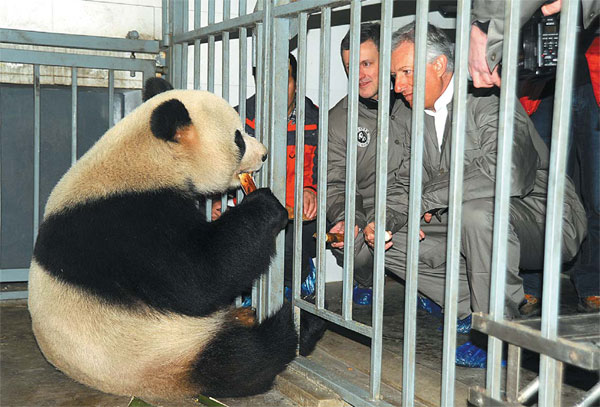Panda pair heads to Belgium
Updated: 2014-02-23 07:46
By Tuo Yannan and Huang Zhiling in Dujiangyan, Sichuan province(China Daily)
|
|||||||||
Fanfare surrounds cuddly creatures' arrival
Belgian Prime Minister Elio Di Rupo and 10,000 compatriots were scheduled to welcome on Sunday a very high-profile Chinese couple upon the first trip to Belgium - 4-year-old pandas Xing Hui and Hao Hao.
The visit's scale and cost outrivals those by royals and superstars.
The animals from the breeding center in China's Sichuan province will live in Belgium for 15 years after they arrive at the Pairi Daizi Zoo on Sunday.
The pandas' arrival will strengthen Sino-Belgian friendship and enhance understanding and connections between China and Europe, Belgian Ambassador to China Michel Malherbe told China Daily.
"China and Belgium have had very deep cooperation in foreign trade and investment, and the panda pair's arrival will further promote the two countries' cultural and people-to-people exchanges," Malherbe said.
This is not the first time for the cuddly Chinese species to visit Belgium.
In 1987, Wan Wan and Xi Xi were loaned to Antwerp Zoo for six months.
Belgian Jeroen Jacobs, 28, recalled his childhood visit to see the animals.
"That was the start of my passion of pandas," he said.
The experience inspired an obsession that led him to start Giantpandazoo.com, which brought him to Sichuan to cover the journey of Xing Hui and Hao Hao.
"I am so excited to come to the pandas' hometown to report the pair to my hometown," he said.
Pairi Daizi - the name of which means "enclosed garden" in ancient Persian - is built on the walled site of a ruined Cistercian abbey. It is acclaimed among Europe's best zoos and features the continent's largest Chinese garden, replete with cranes and red pandas. The garden will, naturally, become the new pandas' abode.
The zoo's founder and president Eric Domb told China Daily he feels like a couple preparing for their wedding ceremony while getting ready for the pandas' impending arrival.
He jokingly said new couples start to feel happy in the days after the big event when they are no longer so busy.
"I will feel better when I see the pandas eating bamboo and sleeping well in my zoo," he said.
Leading Chinese panda experts will also travel to Belgium.
Tang Chunxiang, an experienced veterinarian and assistant to the director of the China Conservation and Research Center for the Giant Panda, said: "Pandas have a strong ability to adapt to the new environment. Xing Hui and Hao Hao will live well and possibly have their cubs during their 15-year stay."
Many people have concerns about the different diet in a foreign land.
"Bamboo is available in the Netherlands, France and Germany," Tang explained.
"European bamboo species are different from those in China. But some are more nutritious than Chinese species."
Tang and Wu Daifu, one of the CCRCGP's best panda keepers, will accompany the panda pair to Belgium. Tang will stay in the Pairi Daiza Zoo for about two months, and Wu will remain for half a year to ensure they adapt.
Tang, who joined the CCRCGP a year after its establishment in 1981, has sent many cuddly bears to foreign countries. On his first trip, he accompanied a panda pair to Singapore for a 100-day exhibition to celebrate the establishment of diplomatic relations between China and Singapore in 1990.
Xing Hui and Hao Hao are the equivalent of 12 years old in a human lifespan.
"They will reach sexual maturity at age 7 and may give birth to cubs," Tang said.
The CCRCGP has established panda research ties with 11 zoos in nine countries - the United States, England, Austria, Australia, Japan, Thailand, Singapore, Malaysia and Belgium.
CCRCGP director Zhang Hemin said 22 pandas from his center have lived overseas and have given birth to 19 cubs. Of those, 12 cubs survived and nine were sent to the center.
Currently, 43 Chinese panda "guests", including their cubs born overseas, live in 17 zoos across 12 countries that have panda research cooperation programs with China. Usually, the lease is 10 years.
Pandas survive solely in six mountainous ranges within Sichuan, Shaanxi and Gansu provinces. The ranges are the Qinling, Minshan, Qionglai, Daxiangling, Xiaoxiangling and Liangshan mountains.
The Chinese government has built 64 nature reserves in the three provinces. These cover 60 percent of pandas' natural habitat and host 70 percent of the wild population, said Liu Yawen, deputy director of the Department of Wildlife Conservation and Nature Reserve Management in the State Forestry Administration.
Contact the writers through tuoyannan@chinadaily.com.cn.
|
Belgian Ambassador to China Michel Malherbe (second from right) and Pairi Daizi Zoo's president Eric Domb (right) feed the panda Xing Hui at the China Conservation and Research Center for the Giant Panda in Sichuan province. Xing Hui and another panda, Hao Hao, were scheduled to arrive at the Belgian zoo on Sunday. Heng Yi / for China Daily |

(China Daily 02/23/2014 page1)
